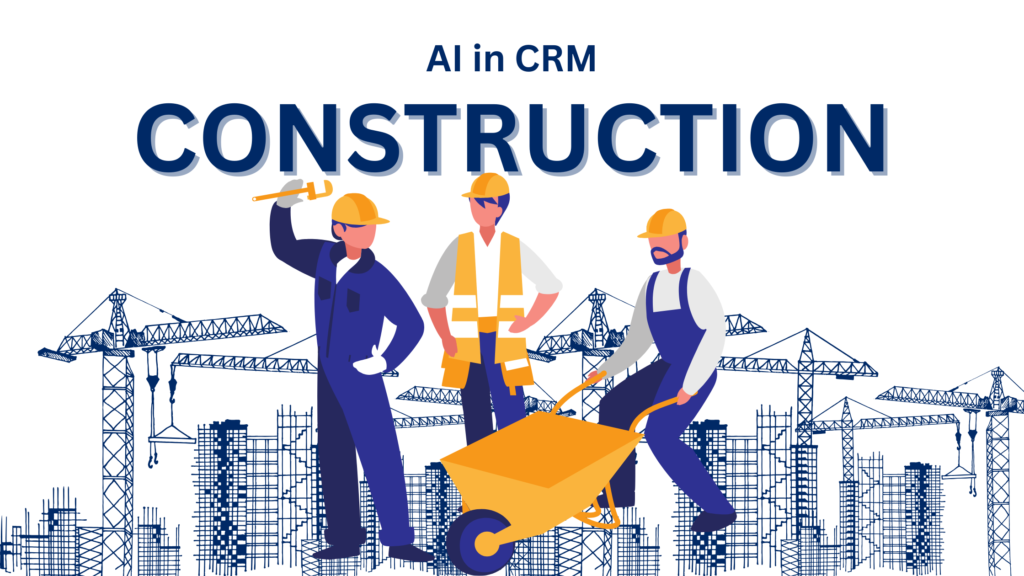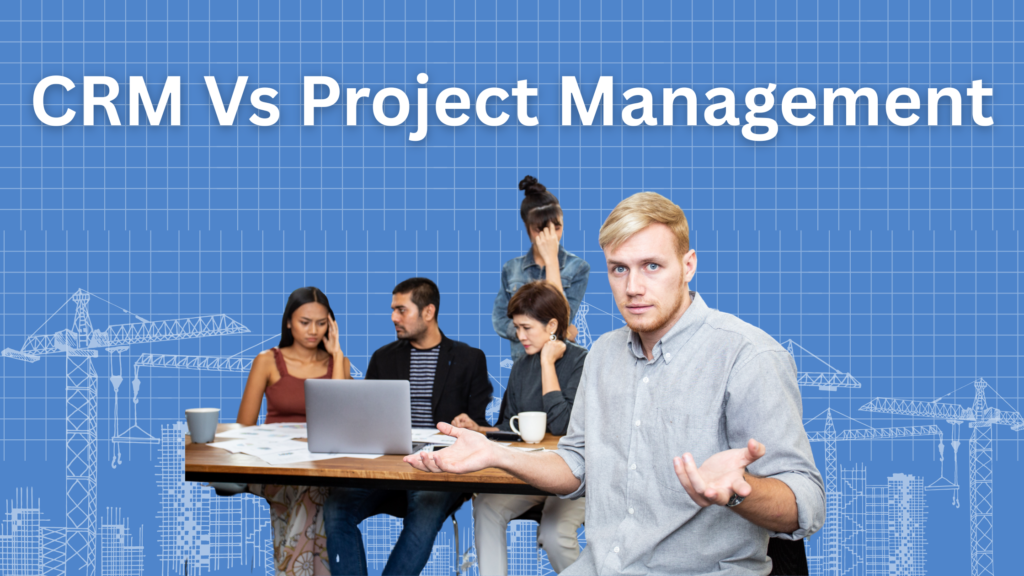
Introduction
The construction industry is no longer just about bricks, concrete, and blueprints. In an increasingly digital world, technology is reshaping how firms operate, manage projects, and interact with clients. One of the most game-changing innovations in recent years is the integration of Artificial Intelligence (AI) with Customer Relationship Management (CRM) systems—commonly referred to as AI CRM.
AI CRM is not just a buzzword; it’s a practical solution that helps construction companies streamline operations, improve communication, and enhance customer relationships. By using AI-driven insights, businesses can predict client needs, automate routine tasks, and optimize workflows, leading to better efficiency, cost savings, and more successful project completions.
In this blog, we’ll break down how AI CRM can help construction firms transform their customer relationship management strategies, enhance lead generation, and ultimately boost profitability.
Understanding AI CRM in the Construction Context
At its core, AI CRM combines traditional CRM software with artificial intelligence capabilities such as machine learning, predictive analytics, and automation. This integration allows construction firms to handle complex data, automate communications, and make data-driven decisions with greater accuracy.
Why AI CRM is Essential in Construction
Unlike many other industries, construction involves a high level of coordination between multiple stakeholders—clients, architects, contractors, subcontractors, suppliers, and regulatory authorities. Managing these relationships efficiently while keeping track of project timelines, cost estimations, and customer interactions can be overwhelming without a robust system. AI CRM helps by:
- Automating Communication: Keeping clients informed about project updates through automated emails and notifications.
- Predicting Customer Needs: Analyzing past interactions to anticipate future requirements.
- Improving Decision-Making: Providing real-time insights into customer behavior, project feasibility, and risk factors.
- Enhancing Collaboration: Offering a centralized platform where all team members can access customer-related data.
By implementing AI CRM, construction firms can move away from outdated spreadsheets and manual tracking, embracing a streamlined system that enhances both productivity and customer satisfaction.
The Benefits of AI-Driven CRM for Construction Companies
Adopting AI CRM offers several advantages that go beyond standard customer management. From automating processes to optimizing lead conversion, here’s how it benefits construction professionals:
1. Enhanced Customer Insights
Customer data is the foundation of any successful business. However, manually analyzing vast amounts of client information can be time-consuming and inefficient. AI CRM systems can:
- Analyze past projects, interactions, and client feedback to identify trends.
- Use predictive analytics to anticipate future needs based on historical data.
- Segment clients based on preferences, project types, or spending patterns.
For example, if a client has frequently requested energy-efficient building solutions, the CRM can suggest eco-friendly construction materials and techniques tailored to their preferences. This level of customization fosters stronger client relationships and increases the likelihood of repeat business.
2. Improved Lead Generation and Qualification
In construction, bidding for projects is a constant process, and not all leads turn into profitable opportunities. AI CRM helps by:
- Identifying High-Potential Leads: AI scans databases, industry trends, and customer inquiries to highlight leads with the highest conversion probability.
- Automating Follow-Ups: Instead of manually tracking leads, AI CRM sends automated reminders and follow-up emails to nurture potential clients.
- Scoring Leads Intelligently: By analyzing engagement levels, AI ranks prospects based on how likely they are to convert into customers.
A well-optimized AI CRM can help construction firms avoid wasting time on low-value leads, focusing instead on opportunities that align with their expertise and business goals.
3. Automation of Routine Tasks
Administrative overhead is one of the biggest pain points in construction management. AI CRM automates repetitive processes such as:
- Scheduling meetings and follow-ups with clients.
- Sending out invoices, contracts, and reminders.
- Updating project progress reports in real time.
This automation reduces human errors and allows teams to focus on more strategic tasks like client negotiations and project execution.
4. Predictive Project Management
Construction projects involve multiple moving parts, making it difficult to predict delays or cost overruns. AI CRM can analyze data to:
- Forecast potential bottlenecks before they become major issues.
- Optimize resource allocation to avoid under- or over-utilization.
- Predict the best time frames for project completion based on historical data.
For example, if a project is running behind schedule, CRM can suggest alternative scheduling options or recommend additional workforce allocation to meet deadlines.
Overcoming Common Challenges in AI CRM Adoption
Implementing AI-driven Customer Relationship Management (CRM) systems in the construction industry offers numerous benefits, yet several challenges can impede successful adoption. Addressing these obstacles proactively ensures a smoother transition and maximizes the return on investment.
1. Resistance to Change
Construction professionals often rely on established methods, leading to hesitation in adopting AI-driven solutions. This resistance can stem from a lack of understanding or fear of job displacement. To mitigate this:
- Education and Training: Offer comprehensive training programs that demonstrate the practical benefits of AI CRM, such as automating repetitive tasks and enhancing decision-making capabilities.
- Stakeholder Involvement: Engage team members in the selection and implementation process to foster a sense of ownership and reduce apprehension.
A study highlighted that inadequate training and support often lead to employees struggling with new systems, underscoring the importance of proper education.
2. Data Integration Issues
Integrating CRM systems with existing legacy software can be complex. Challenges include:
- Data Silos: Disparate systems may lead to isolated data pockets, hindering a unified view of operations.
- Technical Complexity: Legacy systems might not seamlessly integrate with modern AI tools, requiring specialized expertise.
To address these issues:
- Collaborate with IT Experts: Engage professionals skilled in data integration to ensure consistency and accuracy during migration.
- Utilize Middleware Solutions: Employ integration platforms that bridge gaps between old and new systems, facilitating smoother data flow.
Research indicates that poor data integration can lead to inaccurate analyses and financial losses, emphasizing the need for effective strategies.
3. Cost Considerations
The initial investment in AI CRM technology can be substantial, encompassing software acquisition, customization, and training. To justify these expenses:
- Conduct a Cost-Benefit Analysis: Evaluate potential efficiency gains, such as reduced project delays and improved client satisfaction, against the upfront costs.
- Explore Scalable Solutions: Consider CRM platforms that offer modular features, allowing firms to start with essential functions and expand as needed.
While the financial commitment is significant, the long-term benefits, including streamlined operations and enhanced profitability, often outweigh the initial costs.
4. Data Security and Privacy Concerns
AI CRM systems handle sensitive information, making data security paramount. Concerns include:
- Cybersecurity Threats: Inadequate protection can lead to data breaches, exposing confidential project details.
- Regulatory Compliance: Ensuring adherence to data protection laws requires robust security measures.
To safeguard data:
- Implement Advanced Security Protocols: Utilize encryption, secure access controls, and regular system audits.
- Stay Informed on Regulations: Regularly update security practices to comply with evolving data protection standards.
The construction industry often deals with sensitive data, making robust cybersecurity measures essential to prevent potential breaches.
5. Integration with Existing Workflows
Introducing AI CRM systems can disrupt established processes. To minimize operational disruptions:
- Phased Implementation: Gradually integrate AI tools, allowing teams to adapt incrementally.
- Customization: Tailor the AI CRM to align with existing workflows, ensuring it complements rather than complicates processes.
A strategic, well-planned approach to integration helps in aligning new technologies with current operations, reducing resistance, and enhancing efficiency.
By proactively addressing these challenges, construction firms can successfully adopt AI CRM systems, leading to improved efficiency, better client relationships, and a competitive edge in the industry.
Maximizing the Benefits of AI CRM in Construction
Overcoming challenges is only one part of the process—construction firms must also focus on leveraging AI CRM to its full potential. Proper utilization ensures that companies maximize efficiency, reduce costs, and strengthen client relationships. Below are key strategies to extract the most value from AI CRM technology.
1. Optimizing Lead Management with AI CRM
AI-driven CRM systems help construction firms generate, track, and convert leads more effectively. Traditional lead management relies on manual data entry and follow-ups, which often result in missed opportunities. AI CRM changes the game by:
- Automating Lead Scoring: AI evaluates leads based on their interactions, historical data, and probability of conversion. According to HubSpot, businesses using automated lead scoring can increase their conversion rates by up to 30%.
- Personalized Outreach: AI-powered CRMs analyze previous client interactions and recommend tailored messages to improve engagement. A study by McKinsey found that personalized marketing can boost revenue by 10-30%.
By implementing AI CRM, construction firms can focus on the most promising leads while reducing time wasted on unqualified prospects.
2. Streamlining Project Management with AI-Powered Insights
Managing multiple construction projects is complex, but AI CRM simplifies operations by offering:
- Real-Time Progress Tracking: AI-powered dashboards provide live updates on project status, helping managers make informed decisions. According to Deloitte, construction firms that utilize real-time data see a 20% improvement in project efficiency.
- Automated Scheduling & Resource Allocation: AI CRM can predict potential project delays and suggest optimal resource distribution, reducing downtime. Research by Autodesk suggests that poor scheduling contributes to 35% of construction project delays.
With AI CRM, project management becomes proactive rather than reactive, ensuring smoother workflows and on-time project completion.
3. Enhancing Customer Satisfaction with AI-Powered Communication
Client relationships are the backbone of any construction business. AI CRM strengthens these relationships through:
- 24/7 Automated Support: AI-powered chatbots handle customer inquiries instantly, providing quick responses without human intervention. According to Salesforce, 64% of customers expect real-time assistance, making AI chatbots an essential tool.
- Smart Follow-Ups & Reminders: AI CRM automatically schedules follow-ups based on client behavior, ensuring no inquiry is left unanswered.
- Data-Driven Client Insights: AI analyzes past interactions to predict customer preferences, enabling firms to offer tailored services.
With better communication and personalized service, AI CRM significantly improves client satisfaction and retention.
4. Boosting Revenue & Profitability with AI-Driven Insights
Beyond efficiency, AI CRM contributes directly to a company’s bottom line. Construction firms using AI-driven insights report:
- Increased Sales Conversions: AI CRM systems analyze data to optimize pricing strategies, increasing revenue by up to 15%, according to BCG.
- Better Cost Management: Predictive analytics help firms anticipate material shortages, labor costs, and budget overruns, leading to 10-20% savings in operational expenses.
- Competitive Advantage: AI CRM allows businesses to respond faster to market trends, positioning them ahead of competitors who rely on traditional methods.
AI CRM isn’t just a tool for automation—it’s a powerful driver of profitability and long-term success.
Future Trends: The Evolution of AI in Construction CRM
The role of AI in construction CRM will continue to expand, bringing new possibilities such as:
1. AI-Powered Virtual Assistants
Imagine having an AI assistant that can:
- Answer customer inquiries in real time.
- Schedule site visits and follow-ups.
- Send automated reminders to clients and project managers.
These assistants can handle basic queries, allowing employees to focus on more complex tasks.
2. Advanced Data Analytics for Decision-Making
AI will continue to evolve in its ability to:
- Identify market trends and emerging construction demands.
- Optimize pricing strategies based on historical project costs.
- Provide deeper insights into customer preferences and industry shifts.
3. IoT and AI CRM Integration
The Internet of Things (IoT) combined with AI CRM will revolutionize construction management. Smart sensors on job sites will feed real-time data into the CRM, helping:
- Track project progress with live updates.
- Monitor equipment usage and predict maintenance needs.
- Enhance safety measures by analyzing on-site conditions.
Conclusion
AI CRM is no longer a futuristic concept—it’s a necessary tool for modern construction firms looking to improve efficiency, customer relationships, and overall profitability. By leveraging AI-driven insights, automating routine tasks, and optimizing project management, construction professionals can stay ahead in a highly competitive market.
Investing in AI CRM now means better decision-making, improved customer engagement, and long-term business growth. As the industry continues to evolve, those who adopt AI CRM will be best positioned for success.
Ready to transform your construction business with cutting-edge AI CRM solutions? Visit bldon.com today to discover how our platform can streamline your operations, enhance customer relationships, and drive growth. Don’t miss out on the future of construction management—get started now!
Frequently Asked Questions
1. What is AI CRM, and how does it apply to the construction industry?
AI CRM combines artificial intelligence with customer relationship management systems to automate and enhance interactions with clients. In the construction industry, AI CRM helps manage complex data, predict client needs, and streamline communication between stakeholders, leading to improved project outcomes and customer satisfaction.
2. How can AI CRM improve lead generation for construction firms?
AI CRM systems analyze data to identify high-potential leads by scanning databases and industry trends. They automate follow-ups and score leads based on engagement levels, enabling construction firms to focus on opportunities most likely to convert into profitable projects.
3. What are the cost implications of implementing AI CRM in a construction company?
While there is an initial investment in AI CRM technology, the long-term benefits—such as increased efficiency, reduced administrative overhead, and improved project management—often result in significant cost savings. Companies should assess potential return on investment by considering time and resources saved.
4. How does AI CRM enhance project management in construction?
AI CRM offers predictive project management by analyzing data to forecast potential delays, optimize resource allocation, and suggest efficient scheduling. This proactive approach helps in mitigating risks and ensuring projects are completed on time and within budget.
5. What steps should a construction firm take to implement AI CRM successfully?
Successful implementation involves assessing organizational readiness, selecting a user-friendly and scalable AI CRM platform, providing comprehensive training to employees, and ensuring robust data security measures are in place to protect sensitive client information.


